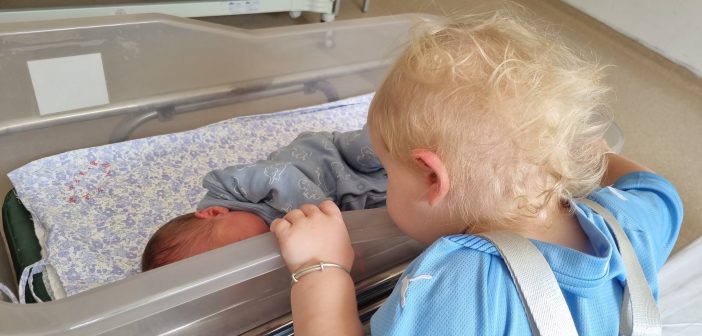For most expatriates, it seems like a clear cut decision to go private for our healthcare needs, much less when it comes to our maternity needs. That’s why it’s so refreshing to hear from two expatriate mothers who made the unique decision to give birth at local public hospitals in Beijing. What’s more, after going through the whole shebang, with its share of ups and downs, they would do it all over again. We at jingkids just had to talk to these two moms who dared to be different and demystify the process of giving birth at a Chinese public hospital.

We last spoke with Rebecca Carter in an interview welcoming her family to Beijing, and she has since delivered her second baby at the Sixth Medical Center of the General Hospital of the Chinese People’s Liberation Army (PLA) (中国人民解放军总医院第六医学中心). Funny story though: Until her 36th week of pregnancy, she had all her doctors’ visits and appointments at a different public hospital – Beijing Integrated Traditional and Western Medicine Hospital (北京中西医结合医院) – which abruptly announced its closure at the end of August. With her baby time bomb ticking down, Rebecca scrambled to find a different public hospital in which to deliver her baby and managed to settle on the PLA’s hospital.

Thankfully, Alfred Carter was born happy and healthy on Sep 12 after a somewhat smooth Caesarean operation. There were a couple of hiccups, which we will delve into later, but nothing major. The best part? The bill came to RMB 11,500, inclusive of a four-night stay in the hospital, epidural, surgery, all medications, and even the hospital pajamas. Once the bill was paid, the deposit of RMB 30,000 that was required upfront was refunded in full. Including the pre-delivery medical bills at the now-defunct hospital, the total cost of welcoming Alfred Carter into Beijing was under RMB 25,000.

In comparison, the standard maternity packages at private hospitals in Beijing start from RMB 100,000 and can go up exponentially. But it wasn’t just the cost that swayed both Rebecca and fellow expat mom Janita S to go public; it was that both expat mothers believe Beijing’s public hospitals are better equipped to handle any emergency medical issues. And in my research, this belief is echoed by many local mothers, especially those above the recommended age of having babies.

Janita told us: “I had a friend who was told by her doctor that she should go to the local hospital to have her baby due to the likelihood of complications in her pregnancy. It does make sense to me. After all, public hospitals have more varied resources like the neonatal intensive care units (NICU) and some of the best doctors in the country.”

For Janita, giving birth to her first child in the Maternal and Child Health Care Hospital in Chaoyang was more straightforward than Rebecca’s experience, since she managed to stay at the same hospital for the entire process. The labor still came with its own challenges, though, namely that she went into labor earlier than anticipated, so the English-speaking gynecologist who had been with her the whole pregnancy was not available and she ended up with a new doctor. Maybe something was lost in translation, or there was a clash of cultural differences, but the new doctor who delivered Janita’s baby did not see eye to eye with her about certain things, such as the need for anesthesia while getting stitched up after tearing during labor.

Both Rebecca and Janita faced unique challenges at different public hospitals in Beijing, but certain aspects of their experiences overlapped, which leads us to believe these might be the norm in public hospitals. These are the similarities:
- Nobody else was allowed to accompany them into the delivery room –not even their husbands. During the pregnancy, their husbands weren’t allowed in the OBGYN room during check-ups, either.
- Rebecca and Janita were subject to varying levels of nakedness in front of several strangers as they were wheeled into the delivery room, while in the delivery room, and as they were returned to their hospital beds. Janita had a hospital gown, but Rebecca was quite naked and felt like “everything was on display for everyone.”
- Mobile devices were not allowed in the delivery room.
Having said that, we must acknowledge that Janita has been shopping various public hospitals to choose where she will deliver her second child in eight months. Armed with insights from her first experience, she is much more confident in what she is looking for and knows how to advocate for herself. She has now found two public hospitals – Beijing LiYing hospital of Maternity and Gynecology (北京俪婴妇产医院) and Peking University First Hospital – that permit husbands during medical check-ups, as well as in the labor room!

It is precisely this sort of knowledge that she wants to share with us in order to address the mistaken preconceived notions many of us hold and to help guide us through the process of having children at public hospitals in Beijing.
Firstly, know that there are dedicated maternity and childcare hospitals in Beijing that are not nearly as crowded as general public hospitals. All the hospitals mentioned in this article are purely devoted to pregnancy and medical maternity needs. To ensure you choose a maternity hospital, Janita suggests searching “妇产医院” (fùchǎnyīyuàn) in your maps app to find one in your neighborhood.
Secondly, language isn’t as big of an issue as you think. While a majority of the staff and doctors at public hospitals may not speak English fluently, there are some who can, as evidenced by Janita’s personal experience. At another public maternity hospital she visited recently (as part of her hospital shopping), the staff and doctors were perfectly happy to communicate in English with her.
Having said that, it is best that you have a local friend who can be your translator, especially if things go south. It also helps if you have some basic Chinese skills and a translation app at the ready!

Images: Courtesy of Rebecca Carter & Janita S.
KEEP READING: A New Club for Your Teenage Aspiring Doctors




